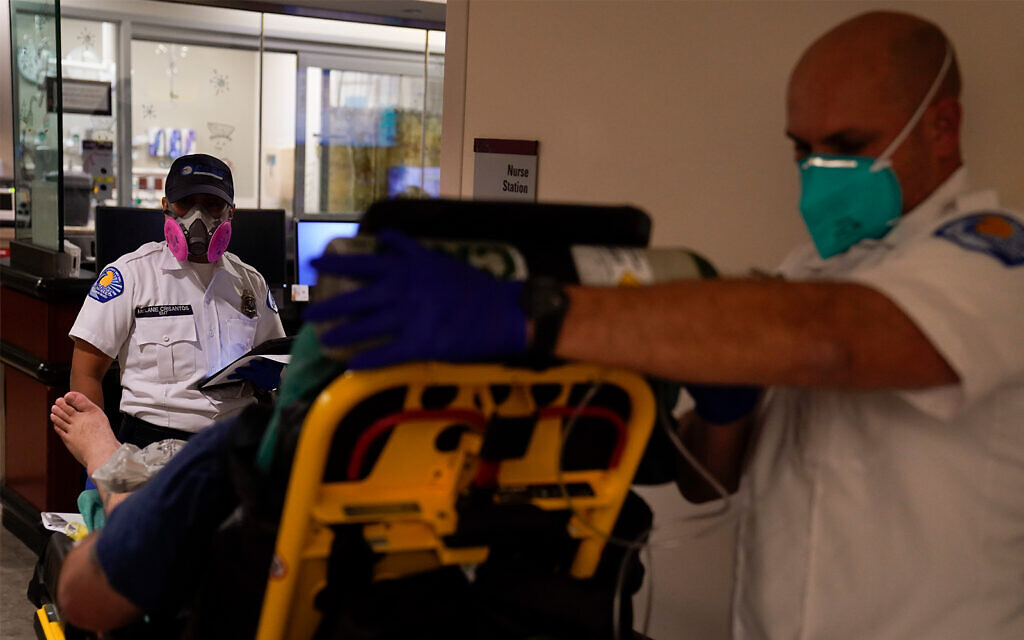The Conversation via AP – A new variant of SARS-CoV-2 is spreading rapidly in the UK, with more than 1,400 cases since September. SARS-CoV-2, the virus that causes COVID-19, generally accumulates mutations slowly over time, but this new variant has accumulated many mutations quickly.
If this new version of the virus is here to stay, as it seems, what does that mean? Will this new version of the virus replace the old one? Will it be easier to catch? And, most importantly, will current vaccines still be effective?
This interests me because I am an evolutionary microbiologist who studies the connection between transmission and the evolution of infectious diseases. In particular, I spend a lot of time considering the effects of vaccines on the evolution of the pathogen and the effects of the evolution of the pathogen on the impact of vaccines.
Get the daily edition of The Times of Israel by email and never miss our top news.
What is the new SARS-CoV-2 mutant that has emerged?
The new version of SARS-CoV-2 – called lineage B.1.1.7 – is spreading across the UK and beyond. The differences between the old virus and the new one include 23 mutations in the virus’s genetic code that altered four viral proteins.
Eight of these 23 mutations affect the protein spike. This is important because the spike protein allows the virus to enter human cells and is an important target for our immune response, both in fighting the virus during infection and in protecting against diseases after vaccination with the Pfizer and Moderna vaccines.
If changes in the spike protein help the virus to enter human cells more easily, the virus can be transmitted from person to person more easily.
These mutations can also alter how well the host’s immune system fights the virus, potentially reducing the effectiveness of current vaccines.

A nurse at a COVID-19 unit in Mission Viejo, California, December 21, 2020. (AP Photo / Jae C. Hong)
What’s different about this new version of SARS-CoV-2?
Samples of the new virus isolated from patients suggest that this variant has increased in relative frequency in the past three months.
The increase in frequency is worrying, as it suggests – but does not prove – that the B.1.1.7 isolates from SARS-CoV-2 are more transmissible than the original virus. Some estimate that the new virus can be up to 70% more transmissible than the old virus. Although these estimates are consistent with the data, it is too early to make a definitive conclusion.
If this increase in transmissibility is confirmed, it may be due to mutations in the peak protein, allowing it to bind more strongly to the ACE2 receptor, which provides a gateway for the virus to enter human cells.
But it can also be due to any of the other changes in the virus.
Is it more dangerous? If so, why?
If the new version, B.1.1.7, is in fact more transmissible than the old virus, it will be more dangerous in the sense that it will make more people sick.
However, I am not aware of good evidence that there is any difference in the severity of the disease caused by the new version of this virus compared to the previous one. That said, with so few known cases, it may still be too early to say.

A COVID-19 is treated by nurses in an emergency room in Mission Viejo, California, December 21, 2020. (AP Photo / Jae C. Hong)
Will the Pfizer and Moderna vaccines still be effective against this new strain?
The Pfizer and Moderna vaccines work by training our immune system to recognize a specific version of the viral protein. The version of the spike protein used by the vaccines was designed to match that of the old virus, not that of the B.1.1.7 virus. This means that vaccines may become less effective than expected if this new virus spreads widely.
The vaccine-virus incompatibility is a constant challenge for scientists charged with developing the vaccine against seasonal flu. But even with a virus-vaccine incompatibility, the flu vaccine reduces the likelihood and severity of the disease.
The question, therefore, is not whether vaccines will be effective, but how effective they will be. The severity of the incompatibility is important, but the only way to determine its impact in this case is through scientific studies and, to my knowledge, no data on this has yet been collected. In other words, it is too early to say whether and how this new variant will influence the overall effectiveness of the Pfizer and Moderna vaccines.
Should people still get the new mRNA vaccine?
The appearance of this new B.1.1.7 makes it all the more important that people are vaccinated as soon as possible.
If this new version is more transmissible, or if the vaccine is less effective due to a virus-vaccine incompatibility, more people will need to be vaccinated to obtain herd immunity and keep the disease under control.
In addition, we now have proof that the SARS-CoV-2 peak protein can change dramatically in a short time, so it is critical that we have the virus under control to prevent it from further evolving and damaging it completely vaccination efforts.
